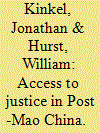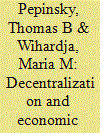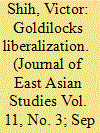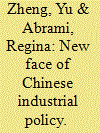|
|
|
Sort Order |
|
|
|
Items / Page
|
|
|
|
|
|
|
| Srl | Item |
| 1 |
ID:
108358


|
|
|
|
|
| Publication |
2011.
|
| Summary/Abstract |
Since the upheaval of the Cultural Revolution decade (1966-1976), post-Mao China has witnessed a sustained period of unprecedented legal reform. Criminal prosecutions and citizen lawsuits against the government, because they pit individual litigants against the authoritarian Chinese state, are two politically significant areas of law. We examine and critically assess the sociolegal scholarship on criminal and administrative legal reform as it has developed over the past few decades, with special attention to shifts in the conventional wisdom regarding legal reform and political liberalism in China and elsewhere. Additionally, we offer both theoretical and empirical suggestions for enhancing the explanatory power of sociolegal research in China.
|
|
|
|
|
|
|
|
|
|
|
|
|
|
|
|
| 2 |
ID:
108351


|
|
|
|
|
| Publication |
2011.
|
| Summary/Abstract |
Indonesia's 1999 decentralization law gave local governments in Indonesia an unprecedented opportunity to adopt prodevelopment policies. In this article, we study whether decentralization has in fact generated improved economic performance in Indonesia. Using a synthetic case control methodology, we argue that Indonesian decentralization has had no discernable effect on the country's national-level economic performance. To explain why not, we use subnational data to probe two political economy mechanisms-interjurisdictional competition and democratic accountability-that underlie all theories linking decentralization to better economic outcomes. Our findings suggest that extreme heterogeneity in endowments, factor immobility, and the endogenous deterioration of local governance institutions can each undermine the supposed development-enhancing promises of decentralized government in emerging economies such as Indonesia.
|
|
|
|
|
|
|
|
|
|
|
|
|
|
|
|
| 3 |
ID:
108356


|
|
|
|
|
| Publication |
2011.
|
| Summary/Abstract |
Nearly two decades after central bankers began to call for interest rate liberalization, the central bank continues to impose stringent rules on the fluctuation of deposit interest rates. This seems an unlikely outcome given widespread endorsement of liberalization by technocrats and experts both in and out of the government, China's accession to the World Trade Organization, and the technocrats' insulation from popular pressure. To be sure, local interests and central bank lobbying have driven gradual liberalization of interest rates. However, senior Chinese technocrats held on to control over interest rates because of their need to maintain state banks' dominance and to mobilize bank funds in times of economic downturns. As such, progress toward interest rate liberalization only to ok place during "Goldilocks" phases when the economy enjoyed healthy growth without high inflation.
|
|
|
|
|
|
|
|
|
|
|
|
|
|
|
|
| 4 |
ID:
108354


|
|
|
|
|
| Publication |
2011.
|
| Summary/Abstract |
Why have China's petrochemical and steel industries behaved so differently in seeking trade protection through antidumping measures, especially given that both industries face the full force of the global economy? We argue that the patterning of antidumping actions is best explained in terms of industrial structures, inclusive of degrees of horizontal concentration and vertical integration. These structures determine a firm's motivation to seek protection as well as its capacity to overcome collective action problems within its industry. In the petro-chemical industry, the shift toward greater horizontal consolidation and vertical integration reduces the collective action problems associated with antidumping petitions among upstream companies. It also weakens downstream companies lobbying in favor of the general protection of highly integrated conglomerates. In the steel industry, by contrast, national industrial policy fails to weaken local state interests sufficiently. Fragmented upstream and downstream channels instead persist, with strong odds against upstream suppliers waging a successful defense of material interests. Such distinctive industrial structures, we show, were a direct result of whether the central government could restructure these designated priority industries in its preferred direction. We find that exogenous price shocks proved particularly helpful in this regard.
|
|
|
|
|
|
|
|
|
|
|
|
|
|
|
|
| 5 |
ID:
108355


|
|
|
|
|
| Publication |
2011.
|
| Summary/Abstract |
Why did the unified government led by Taiwan's president Ma Ying-jeou experience gridlock? In this article, I answer this question by modifying the veto player theory to explain how policies are made in Taiwan's semipresidential system, in which the president can unilaterally appoint a premier who is accountable to the national legislature. Given this constitutional design, the premier represents the president rather than the legislature, so the agenda setter is either the legislature or the president. A veto player model shows that the legislature, as a collective veto player, has the last-mover's advantage when it sets the agenda and that the two executive heads are more likely to be in congruent if a policy has to be deliberated by the legislature. The president sets the agenda only if he can discipline the legislators in his party and the legislature is not allowed to amend an executive proposal. This theory explan is why policies involving lawmaking give Taiwan's Legislative Yuan considerable bargaining powers, even to the disadvantage of the president. These theoretical arguments are confirmed by hypothesis-based case studies and can be generalized to study other semipresidential regimes.
|
|
|
|
|
|
|
|
|
|
|
|
|
|
|
|
|
|
|
|
|